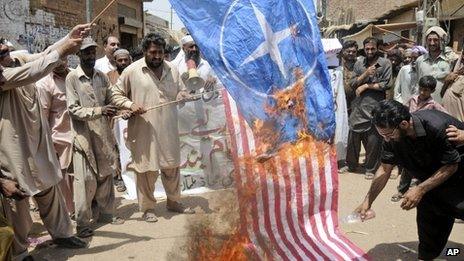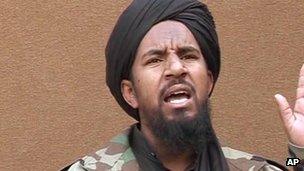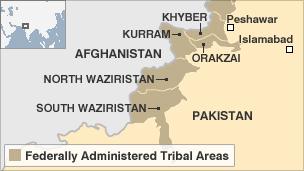Pakistan summons US envoy over drone strikes
- Published

US drone strikes stoke public anger in Pakistan
Pakistan's foreign ministry has summoned a senior US diplomat to lodge a formal protest over a series of drone strikes in its volatile tribal regions.
There have been eight drone attacks in Pakistan's north-western tribal territory over the past two weeks.
US officials say a strike on Monday targeted al-Qaeda's second-in-command, Abu Yahya al-Libi, but it is unclear if he was among 15 killed in the assault.
Pakistan's call for an end to strikes comes amid a rift with Washington.
It says that drone strikes represented a "clear red line for Pakistan".
Tension between the reluctant allies has been intensified by a dispute over Pakistan's closure of supply routes to Nato troops in Afghanistan, after a Nato air strike along the Afghan border killed 24 Pakistani soldiers.
Pakistan's foreign ministry summoned Washington's deputy ambassador to Islamabad, Richard Hoagland, to "officially convey the government's serious concern regarding drone attacks in Pakistani territory".
A statement repeated the stance that drone strikes were "unlawful, against international law and a violation of Pakistan's sovereignty".
Many observers believe the attacks have been a means of applying pressure on Islamabad after a deal to reopen Nato supply routes fell through.
The BBC's Aleem Maqbool in Islamabad says that if it is confirmed that Abu Yahya al-Libi has been killed, Washington may feel vindicated.
But the news will not appease a large section of Pakistani society, for whom US drone attacks on their soil have become a source of considerable resentment, our correspondent reports.
'Major blow'
Monday's strike targeted a suspected militant compound in North Waziristan, near the Afghan border.
Two missiles by the unmanned aircraft killed 15 people, Pakistani officials say.
A senior US official told the BBC that Libi was the target of the attack in Hesokhel, to the east of Miranshah, the main town in North Waziristan.

Libi is reportedly in charge of day-to-day operations in Pakistan's tribal areas
The first missile struck the compound, killing three militants, Pakistani security officials said.
A second missile then killed 12 more militants who had arrived at the scene, they added.
If Libi's death is confirmed, it would be a "major blow to core of al-Qaeda", the US official told the BBC.
Washington believes that following Osama Bin Laden's death last year, Libi, an Islamic scholar from Libya, became al-Qaeda's second-in-command after Egyptian-born Ayman al-Zawahiri.
Libi is reportedly in charge of day-to-day operations in Pakistan's tribal areas.
He was reported killed in a drone strike in Pakistan in 2009, but it turned out to be a case of mistaken identity.
Civilian casualties
Pakistan's frontier tribal region is considered a hub of activity by al-Qaeda and Taliban militants.
This was the eighth and deadliest attack since 23 March, marking a considerable upsurge in the use of the controversial US drone programme, reports the BBC's Aleem Maqbool in Islamabad.

Pakistan says the drone attacks fuel anti-US sentiment and claim civilian casualties along with militants. The US insists the strikes are effective.
Washington does not normally comment on individual drone operations, which have killed hundreds of people in recent years.
The dead include senior al-Qaeda and Taliban leaders, as well as an unknown number of other militants and civilians.
The frequency of the attacks has increased since President Barack Obama took office in 2008.
More than 100 raids were reported in the area in 2010, and more than 60 took place last year.
But this strike comes days after more details of the Obama administration's drone policy emerged in the US.
Administration officials told the New York Times, external that Mr Obama and top security officials regularly consult on adding militants to a drone "kill list" - and said the US president personally approves or vetoes each strike.
- Published30 May 2012
- Published4 May 2012
- Published1 May 2012
- Published31 January 2012
- Published23 May 2012
- Published31 January 2012